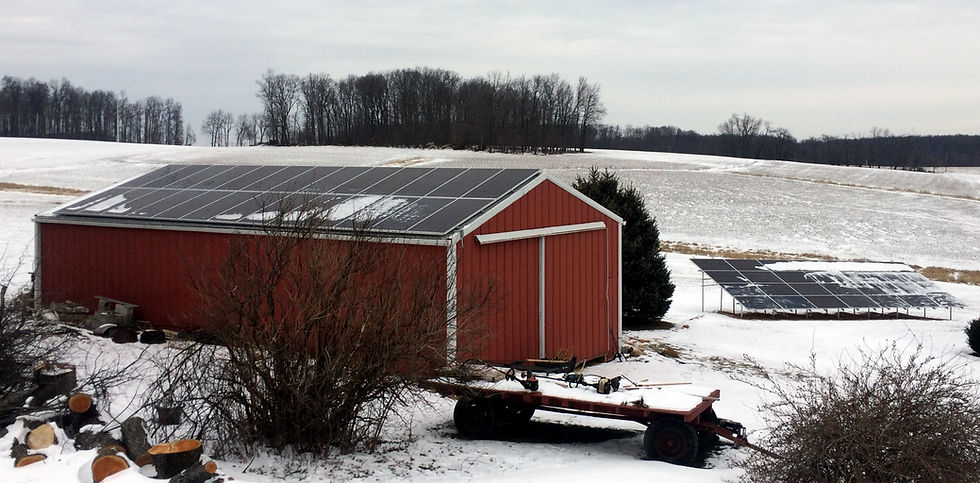Solar Panels with Snow in PA: Maximizing Winter Efficiency
- Jan 16, 2024
- 2 min read
Updated: Feb 1, 2025
The Impact of Solar Panels with Snow in PA
Snow can temporarily reduce solar panel efficiency by blocking sunlight. However, solar panels are designed to shed snow naturally due to their angled installation. In snowy climates, energy estimates already account for seasonal variations, ensuring accurate year-round production predictions.

Winter Performance of Solar Panels
Contrary to popular belief, solar panels work great in winter! Here’s why:
Cold Temperatures Boost Efficiency – Solar panels actually perform better in cooler temperatures than in extreme heat.
Snow Can Be a Good Thing – A light layer of snow can reflect sunlight, increasing energy absorption. Plus, most panels are designed so snow slides right off!
Battery Backup for Winter Storms – A solar battery keeps your home powered even if the grid goes down.
How to Get the Most from Solar in Winter
Store Excess Energy – Use a battery system to save up sunny-day power for cloudy ones.
Upgrade to Smart Inverters – These help optimize energy output even on lower-light days.
Keep Panels Clear – A solar-friendly snow rake can safely remove heavy snow.
Adjust Panel Angles – Tilting panels slightly can help them shed snow faster.
Pair with Other Renewables – A wind-solar hybrid system keeps power steady year-round.
Enjoy Solar Savings All Year
Winter doesn’t mean higher electricity bills! Thanks to net metering and solar buyback programs, any extra energy your system produces in summer rolls over, helping you save when the days are shorter.

See Solar in Action!
Check out our latest video showing real winter solar performance! [Insert link or embed video here]
Ready to Power Your Home with Solar?
Don’t let winter myths hold you back—solar works in all seasons! Learn more at PAwindandsolar.com or call 833-WINDSOL for a free consultation today!
In regions with snowy winters, this issue becomes particularly relevant. However, solar energy system designers and evaluators take into account the seasonal variations in weather, including snowfall. Average production estimates in a solar evaluation are calculated by considering the year-round weather patterns, and adjustments are made to account for potential losses during snowy periods.
Solar panels are typically installed at an angle to maximize exposure to sunlight and facilitate the shedding of snow. Additionally, advancements in technology have led to the development of snow-resistant coatings that can help minimize the accumulation of snow on solar panels.
During the winter months, when snowfall is common, the solar energy production estimates are adjusted to reflect the reduced output during these periods. This ensures that the overall annual energy production is accurately predicted, taking into consideration the impact of snow and other weather conditions.

Despite the temporary reduction in energy production during snowy periods, snow on solar panels in PA doesn't keep them from remaining a viable and sustainable source of electricity throughout the year. The integration of accurate weather data and adjustments in production estimates allows for a more realistic evaluation of solar energy systems in diverse climates.
Visit PAwindandsolar.com today to begin your free solar evaluation or call 833-WINDSOL





Comments